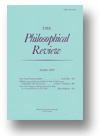
PHILOSOPHICAL REVIEW
Scope & Guideline
Advancing Philosophical Discourse
Introduction
Aims and Scopes
- Phenomenology and Existentialism:
The journal publishes works that delve into the intricacies of phenomenological and existentialist thought, examining the works of key figures such as Husserl, Heidegger, and Merleau-Ponty, as well as their contemporary interpretations and applications. - Philosophy of Science and Technology:
A significant area of focus includes the philosophical implications of scientific and technological advancements, exploring concepts such as objectivity, measurement, and the symbolic nature of scientific inquiry. - Ethics and Moral Philosophy:
The journal engages with ethical considerations, particularly in relation to human experience, care, and community, reflecting on how these concepts shape our understanding of moral responsibility. - Interdisciplinary Approaches:
There is a consistent emphasis on interdisciplinary dialogue, with contributions that incorporate insights from literature, sociology, psychology, and cultural studies, thereby enriching philosophical analysis. - Historical Contextualization:
The journal often situates philosophical inquiries within historical contexts, examining how past philosophical movements inform contemporary discussions and dilemmas.
Trending and Emerging
- Aging and Ontology:
There is a notable increase in discussions surrounding the philosophy of aging, exploring ontological perspectives on aging and its implications for identity and community, reflecting a growing societal awareness of demographic shifts. - Media and Technology in Philosophical Discourse:
Emerging themes related to media, technology, and their phenomenological implications are becoming more prominent, highlighting the impact of digital culture on human experience and perception. - Intersectionality in Ethics:
Recent works have increasingly addressed intersectional approaches to ethics, examining how different identities and experiences shape moral considerations and responsibilities. - Environmental Philosophy:
The journal is showcasing a rising interest in environmental philosophy, particularly in relation to phenomenological approaches to nature and the human condition, addressing urgent ecological concerns. - Critical Phenomenology:
There is an expanding focus on critical phenomenology, which interrogates the intersections of phenomenology with social justice issues, power dynamics, and the lived experiences of marginalized communities.
Declining or Waning
- Traditional Metaphysics:
There seems to be a waning interest in traditional metaphysical discussions, particularly those that do not engage with contemporary phenomenological or existential concerns, as newer papers tend to focus more on practical implications and lived experiences. - Analytic Philosophy:
The journal has seen fewer contributions that align strictly with analytic philosophy, suggesting a possible shift towards more continental approaches and a preference for qualitative over quantitative analyses. - Political Philosophy in Isolation:
While political philosophy remains relevant, there is a noticeable decline in papers that treat political theory in isolation, with a growing trend towards integrating these discussions within broader phenomenological frameworks.
Similar Journals
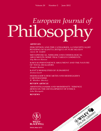
EUROPEAN JOURNAL OF PHILOSOPHY
Unveiling the complexities of philosophy with rigorous scholarship.European Journal of Philosophy, published by Wiley, stands as a premier academic journal in the field of philosophy, recognized for its rigorous scholarship and impactful contributions. With an impressive Q1 ranking in Philosophy as noted in the 2023 category quartiles, the journal places within the top echelons of its field, reflecting its commitment to advancing philosophical discourse. Covering a broad spectrum of philosophical topics, the European Journal of Philosophy features peer-reviewed articles that engage both contemporary discussions and foundational theories, making it an invaluable resource for researchers, professionals, and students alike. The journal's accessibility to readers in the United Kingdom and beyond ensures a wide dissemination of knowledge, fostering an international dialogue that enriches philosophical inquiry. With a convergence of intellectual contributions since 1993, the journal continues to push the boundaries of philosophical thought into 2024 and beyond.
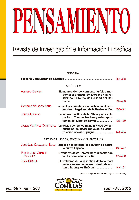
PENSAMIENTO
Fostering Open Access to Philosophical InquiryPENSAMIENTO is a distinguished journal published by the Universidad Pontificia Comillas Madrid, Faculty of Philosophy, providing a platform for scholarly discourse in the field of philosophy. With its ISSN 0031-4749 and E-ISSN 2386-5822, the journal has embraced Open Access since 2016, promoting wider dissemination of philosophical research and thought. Located in Spain, it has established itself as a vital resource for academics, researchers, and students interested in contemporary philosophical inquiries and discussions. As of 2023, PENSAMIENTO is ranked Q3 in the Arts and Humanities, specifically within the Philosophy category, highlighting its emerging impact in the scholarly community with a Scopus rank of #575 out of 806, placing it in the 28th percentile. With its coverage spanning from 2002 to 2024, PENSAMIENTO is committed to contributing to the ongoing evolution of philosophical thought and ensuring that fresh perspectives can thrive within academia.
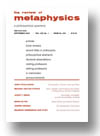
REVIEW OF METAPHYSICS
Connecting scholars to the heart of philosophical exploration.REVIEW OF METAPHYSICS is a distinguished journal published by PHILOSOPHY EDUCATION SOC, INC, dedicated to advancing scholarly discourse in the field of philosophy. With an ISSN of 0034-6632 and an E-ISSN of 2154-1302, this journal has been a crucial platform for philosophical inquiry since its inception in 1975, converging its rich content from 1992 and continuously serving the academic community up to 2022. Based in the United States, specifically at 223 Aquinas Hall, Catholic University America, Washington, DC, it has secured a reputation for quality, reflected in its placement within the Q3 category of the 2023 Philosophy rankings, and a Scopus rank of 367 out of 806 in Arts and Humanities, placing it in the 54th percentile. Although it does not offer open access options, the REVIEW OF METAPHYSICS remains an essential resource for philosophers and students alike, fostering critical perspectives on metaphysical issues, and thereby contributing significantly to the advancement of philosophical studies.

PHILOSOPHICAL STUDIES
Exploring the Depths of Critical InquiryPhilosophical Studies, published by Springer, is a prestigious peer-reviewed journal that stands at the forefront of philosophical discourse since its inception in 1950. With ISSN 0031-8116 and E-ISSN 1573-0883, this journal has firmly established itself as a critical platform for disseminating high-quality research in philosophy, positioned in the Q1 category for Philosophy with an impressive Scopus rank of #73 out of 806, placing it in the 90th percentile of its field. Although it does not offer Open Access, the journal’s rigorous selection process ensures that only the most relevant and impactful studies are published, making it an invaluable resource for philosophers, academics, and students alike. With a commitment to advancing philosophical inquiry and fostering a vibrant scholarly community, Philosophical Studies continues to attract contributions that challenge prevailing paradigms and explore new dimensions in philosophical thought. The journal's scope encompasses a wide array of topics within philosophy, encouraging interdisciplinary engagement and dialogue.

Filosofskii Zhurnal
Navigating the Landscape of Cultural and Philosophical StudiesFilosofskii Zhurnal, published by the esteemed Russian Academy of Sciences - Institute of Philosophy, is a renowned academic journal focused on the vibrant fields of Philosophy, Cultural Studies, History and Philosophy of Science, and Linguistics. With an ISSN of 2072-0726 and an E-ISSN of 2658-4883, this esteemed publication has been a pivotal source of scholarly discourse since its inception in 2019, with converged years extending through 2024. Holding a distinguished Q2 quartile ranking in several disciplines, the journal is instrumental in advancing knowledge and research within its realms, making significant contributions to the understanding of philosophical thought, cultural dynamics, and language interpretation. Although it does not currently offer open access options, the journal maintains a strong presence in Scopus with notable rankings, including its position at #490/806 in Philosophy and #837/1304 in Cultural Studies. By providing a platform for original research, critical reviews, and interdisciplinary dialogue, Filosofskii Zhurnal serves as a valuable resource for researchers, professionals, and students seeking to deepen their understanding of philosophical inquiry and related fields.

Convivium
Connecting Minds Through Critical ResearchConvivium is a distinguished open-access journal published by the Universitat de Barcelona, Facultat Filologia, specializing in the field of philosophy. Since its inception, the journal has committed to fostering scholarly dialogue by providing a platform for innovative and critical research. Operating under an open-access model since 2007, Convivium ensures that its articles, which span a range of contemporary philosophical topics, are freely accessible to a global audience, thereby promoting the dissemination of knowledge. Despite facing challenges indicated by its current Scopus rank in the 2nd percentile of the Arts and Humanities, and its Q3 quartile in 2023, Convivium continues to thrive as an important resource for researchers, professionals, and students engaged in philosophical inquiry. With published volumes converging from 2009 to 2014, 2017 to 2018, and 2021 to 2023, the journal is poised to contribute significantly to the ongoing discussions and developments in philosophy.

Sophia
Connecting Minds through Philosophical Inquiry and Spiritual ReflectionSophia, a prestigious journal published by Springer, is a leading platform for the advancement of knowledge in the fields of Philosophy and Religious Studies. Established in 1962, this open-access journal has embraced a global perspective and invites scholarly contributions that explore complex philosophical questions and the intricacies of religious thought. With an impact factor that reflects its significance, Sophia ranks in the top quartiles of its categories on Scopus, specifically Q2 in Philosophy and Q1 in Religious Studies, showcasing its influence and reach within the academic community. With convenient open access options available since 2009, the journal ensures that research disseminates freely, promoting engagement among researchers, professionals, and students alike. Located in the Netherlands and connected to a reputable international network, Sophia remains committed to fostering intellectual dialogue and enriching the discourse surrounding philosophical and religious issues worldwide.
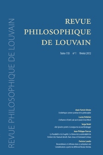
REVUE PHILOSOPHIQUE DE LOUVAIN
Cultivating Intellectual Engagement in Leuven and BeyondREVUE PHILOSOPHIQUE DE LOUVAIN is a distinguished academic journal dedicated to the exploration of philosophical discourse and thought, published by PEETERS in Belgium. With an ISSN of 0035-3841 and E-ISSN 1783-1768, this journal has been a significant contributor to the field of philosophy since its inception in 1973. Although it has been classified in Q4 in the 2023 Philosophy category with a Scopus rank of 488 out of 762, the journal has established a reputation for fostering rigorous dialogue and covering a diverse array of philosophical topics through comprehensive articles and critical essays. Despite a temporary discontinuation in Scopus coverage from 2019 to 2021, REVUE PHILOSOPHIQUE DE LOUVAIN remains a significant platform for scholars, professionals, and students looking to engage deeply with contemporary philosophical issues. The journal's commitment to philosophical inquiry is complemented by its accessible publication model, although it does not currently offer open access options. For those based in or visiting Leuven, Belgium, the journal's office is located at BONDGENOTENLAAN 153, B-3000 LEUVEN, BELGIUM, a hub of intellectual engagement in the heart of Europe.

Journal of Japanese Philosophy
Engaging with the Nuances of Japanese Philosophical TraditionsThe Journal of Japanese Philosophy, published by SUNY Press, serves as a pivotal platform for scholars and practitioners interested in the rich tapestry of Japanese philosophical thought. With its ISSN 2327-0195 and E-ISSN 2327-0209, this journal invites rigorous scrutiny and creative engagement with both traditional and contemporary philosophies emerging from Japan. While the journal does not currently offer Open Access options, it remains accessible through major academic libraries and databases. By fostering interdisciplinary dialogue, the Journal of Japanese Philosophy aims to illuminate various aspects such as aesthetics, ethics, politics, and environmental philosophy, contributing significantly to the broader field of philosophy. As a respected source of scholarship, it plays a critical role in shaping the understanding of Japanese philosophy within global contexts, making it an essential resource for researchers, professionals, and students alike.

Balkan Journal of Philosophy
Illuminating Unique Perspectives from the BalkansBalkan Journal of Philosophy, published by ACAD PUBL HOUSE, stands as a significant contribution to the field of philosophy, particularly within the Balkan region. With an ISSN of 1313-888X and an E-ISSN of 2367-5438, this journal aims to advance philosophical discourse and scholarship from 2017 to 2024, making it a vital platform for emerging ideas and scholarly debates. Despite its emerging status, it holds a respectable Q3 quartile ranking and is positioned in the 22nd percentile for Arts and Humanities in Scopus, reflecting its growing impact in the academic community. Researchers and students alike can access vital philosophical studies that explore diverse themes and perspectives unique to the region. The journal not only fosters a broader understanding of philosophical thought but also encourages cross-cultural dialogues, making it an essential resource for anyone invested in philosophical inquiry.